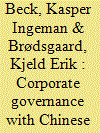| Srl | Item |
| 1 |
ID:
185621


|
|
|
|
|
| Summary/Abstract |
This article analyses the role of the Chinese Communist Party (CCP) in the corporate governance of Chinese state-owned enterprises (SOEs), including a case study of a central-level SOE holding group. Relying on official documents, secondary literature and interviews with enterprise managers, government officials and academics, the article documents how the CCP has actively formalized its role in Chinese business by embedding itself in the corporate governance structure of SOEs. Through the application of Chinese indigenous administrative corporate governance concepts such as “bidirectional entry, cross appointment” and “three majors, one big,” the CCP has consolidated its dominance of enterprise decision-making procedures and personnel appointment and created a hybrid, Party-led model of corporate governance. While this hybrid model can secure enterprise compliance, communication with higher state and Party organs, as well as long-term development planning, it is unlikely to help solve SOE efficiency problems and may even undermine other SOE reforms.
|
|
|
|
|
|
|
|
|
|
|
|
|
|
|
|
| 2 |
ID:
192092


|
|
|
|
|
| Summary/Abstract |
This article offers a detailed analysis of the policy design of the current fourth round of state-owned enterprise (SOE) corporate restructuring in China. This time, the state’s efforts to improve SOE performance hinged on attracting private capital to take ownership shares in state firms—or so-called mixed-ownership reforms. The article relies on an analysis of policy documents, interviews with policy experts in China, and a case study of local mixed-ownership reform implementation in the city of Nanjing. It discusses implications of mixed ownership for corporate governance amid changing state–Party–business relations in China. It concludes that the reform agenda consolidates a hybrid political-economic system that organically blends planning and market modes of economic coordination, as well as public and private modes of ownership.
|
|
|
|
|
|
|
|
|
|
|
|
|
|
|
|